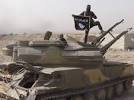Iraqi forces closing in on ISIS in Ramadi, military official says
Iraq's military is just about a mile away from the ISIS-held government compound in Ramadi in Iraq's battle to retake the city from the terrorist group, a spokesman for the Joint Iraqi Operations Command said.
Col. Mohammed Ibrahim said, "Thousands of improvised explosive devices were planted in the district by Daesh (ISIS). Each one needs at least 30 minutes to be dismantled."
Soldiers are going slowly through liberated neighborhoods of the city looking for ISIS terroists amids the IEDs. "We have to be very patient in order not to lose any soldier or any civilian in the area," Ibrahim said.
With the help of U.S.-led coalition airstrikes, Iraqi forces are in the second day of a coordinated attack on Ramadi, a city about 70 miles (113 kilometers) west of Baghdad and the capital of Anbar province.
The Iraqi flag has been hoisted over two recaptured Ramadi neighborhoods, Iraq's Joint Operations Command said.
ISIS took over Ramadi in May after a year of fighting there, spurring tens of thousands of civilians to flee.
But tens of thousands of civilians remain in Ramadi, and "ISIS is surrounding them and preventing them from leaving," said Hikmet Suleiman, an adviser to the governor of Anbar province.
Iraqi forces had control of areas in Anbar province before the latest push into the center of Ramadi.
Two weeks ago, security forces started to encircle the city. On Tuesday, they were able to bridge a canal of the Euphrates River and close in on the city center, said Col. Steven Warren, a spokesman for the coalition.
The presence of Iraqi forces around Ramadi is "like a boa constrictor, a squeezing of ISIL out of that city," Warren said, using another name for ISIS.
He credits the yearlong U.S. training of Iraqi security forces for the successful advances.
"That training is starting to take hold," he said.
Who is fighting?
Ramadi has strategic importance, because Anbar is the heartland of Iraq's Sunni Muslim population and because the city is close to Baghdad.
Government officials said there are no Shiite militias involved in fighting on the front lines to liberate Ramadi.
Iraqi security forces, including the military, counterterror units and federal police, are conducting all the storming operations underway inside Ramadi's city limits, according to Hikmet Suleiman, the political adviser to Anbar Gov. Suhaib al-Rawi.
He said some Shiite militias are stationed on the southern outskirts of Ramadi, but are not directly involved in ongoing operations, and Sunni militias comprised primarily of Anbar tribesmen are tasked with holding ground already recaptured by Iraq's military and clearing it of IEDs.
Having Shiite militias battle in this Sunni stronghold was a concern of the central government, especially in procuring support from among the local tribes in the battle against ISIS.
Ramadi matters
Ramadi has symbolic significance. After Iraqi forces pulled out of Ramadi in May, U.S. Defense Secretary Ashton Carter questioned whether the Iraqis had the "will to fight."
Iraqi officials, including Prime Minister Haider al-Abadi, later said Carter had bad information. But Salim al-Jabouri, speaker of the Iraqi parliament and arguably the country's most powerful Sunni politician, said that even the Prime Minister didn't know of the withdrawal until after it happened.
Ramadi was one of "three R's" identified as the core of a triple-pronged U.S. strategy against ISIS that Carter floated before U.S. lawmakers in October. The others were raids by special operations forces and Raqqa, the extremists' de facto capital in Syria.
News Courtesy: www.cnn.com











